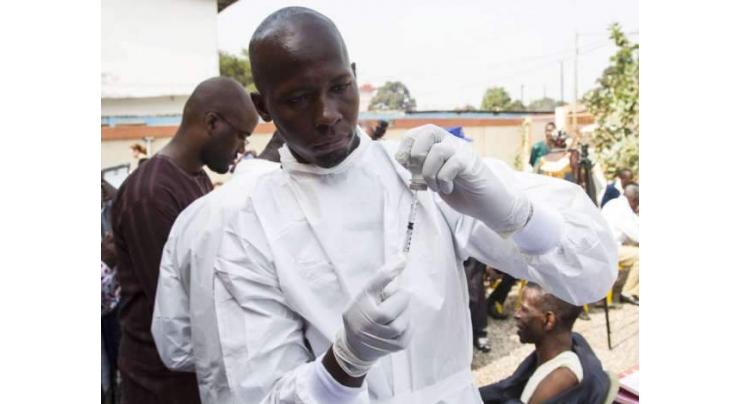
Stopping Ebola In Its Tracks: Which Vaccine Will Do It?
Mohammad Ali (@ChaudhryMAli88) Published December 23, 2016 | 08:05 PM

PARIS, (APP - UrduPoint / Pakistan Point News - 23rd Dec, 2016 ) : Forty years after emerging in what is today the Democratic Republic of Congo, the Ebola virus may finally have met its match in a vaccine which could be "up to 100 percent effective", according to its makers.
Dubbed rVSV-ZEBOV, the vaccine is one of at least 15 being designed worldwide. Since the end of the West African Ebola outbreak earlier this year, however, developers sit with a unique dilemma: they can only test a vaccine's ultimate efficacy by checking if it protects people in the midst of an epidemic.
Here are brief descriptions of the leading contenders for a vaccine to stop the deadly haemorrhagic fever, for which there is no cure. - rVSV-ZEBOV - ============== The frontrunner vaccine candidate has been developed by pharma company Merck, Sharp & Dohme and funded by the World Health Organization (WHO), Canada's Public Health Agency and other donors.
It uses a modified version of the vesicular stomatitis virus (VSV), which causes illness in rodents, cattle, pigs and horses. Not dangerous to humans, the virus has had one of its genes replaced by an Ebola virus gene.
The vaccine prompts the human body to develop antibodies against the invader, so that when Ebola attacks, the antibodies are quick to identify it and fight back. According to final trial results released by the WHO on Friday, not one of the nearly 6,000 people given the vaccine in Guinea contracted Ebola within 10 days.
The trial was conducted when the outbreak was already winding down in 2015. In a comparison group of similar size, not given the vaccine, there were 23 cases in the 10 days. Guinea, Liberia and Sierra Leone were the countries hardest hit by the 2014-16 outbreak which made nearly 29,000 people ill and killed more than 11,300.
rVSV-ZEBOV could become available for use in 2018, under a fast-track drug-approval process. - chAd3 - ========= Britain's GlaxoSmithKline and the US National Institute of Allergy and Infectious Diseases (NIAID) have been developing the other of the two most advanced trial vaccines.
It is based on a type of chimp cold virus, known as an chimpanzee adenovirus type 3 (ChAd3), to which an Ebola virus gene has been added. Phase I trials, the first step in vetting a new drug for safety and effectiveness, were conducted in the United States, Britain, Switzerland and Mali.
These showed the drug was safe, and people injected with it developed Ebola antibodies. It went straight to Phase III tests in Liberia, but the epidemic ended and the trial was stopped without reporting any results. A Phase III trial is meant to test whether a vaccine protects people under natural disease conditions -- the final step before licensing.
Related Topics
Recent Stories

Mired in crisis, Boeing reports another loss

Session Awarding Ceremony 2024 held at Cadet College Muzaffarabad

Austrian ski great Hirscher to make comeback under Dutch flag

Pakistan, Japan agrees to convene 'Economic Policy Dialogue'

FM Dar conveys deepest sympathy on torrential rains devastation in UAE

Spain PM Sanchez says weighing resignation after wife's graft probe

Tennis: ATP/WTA Madrid Open results - 1st update

Long-lost Klimt portrait auctioned off for 30 mn euros

Osaka seals first win on clay since 2022 in Madrid

Earthquake jolts Karachi

Sindh minister orders operation after attack on police in Ghotki

TikTok to fight US ban law in courts
More Stories From World
-
Football: English Championship table
1 hour ago -
Time for 'democratic transition' in Venezuela: opposition candidate to AFP
2 hours ago -
Spain's Pedro Sanchez : a risk-taker with a flair for survival
2 hours ago -
Football: French Ligue 1 table
2 hours ago -
Nadal will only play French Open if he can 'compete well'
2 hours ago -
Ukraine, Israel, TikTok: the massive aid package before US Congress
2 hours ago
-
TikTok to fight US ban law in courts
2 hours ago -
Football: French Ligue 1 results
3 hours ago -

Spain PM Sanchez says weighing resignation after wife's graft probe
4 hours ago -

Long-lost Klimt portrait auctioned off for 30 mn euros
4 hours ago -

TikTok to fight US ban law in courts
4 hours ago -

Anger among Ukrainians in Poland as Kyiv halts passport renewals
4 hours ago



